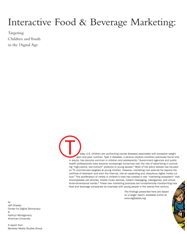
program areas Digital Youth
Program Areas
-
In a 4-0 decision, the FTC agreed with CDD and a coalition of consumer, public health, and child advocay groups to reject calls from the online marketing lobby to delay the implementation of the new COPPA rules. The decision can be read here. (link is external)Our coalition's oppostion to the industry request played an important role in the commission's decision. It can be reviewed here. (link is external)The commission's action sent an important message that protecting the privacy of children and empowering parents/caregivers is a core value which must be respected.
-
Blog
CDD Presentation at World Health Org on Digital Alcohol Marketing
We will present this Wed. at the WHO's Global Alcohol Policy conference. Our presentation is: The Digital Marketing of Alcoholic Beverages to Youth: How Social Media, Mobile Devices, Personalized Data Collection and Neuromarketing have transformed the global advertising landscape.
Here's the abstract.Powerful new digital marketing techniques permit beer and alcohol companies to deeply penetrate into the hearts and minds of consumers, and their social networks of friends. The growing sophistication and capabilities of online marketing, increasingly integrated into the lifestyles of youthful and Internet connected consumers throughout the world, pose potential public health concerns—as well as opportunities. Marketing today has been transformed from the viewing of a single advert on television or in print, into experiencing interactive and highly personalized content that influences what we consume and purchase. Alcoholic beverage companies are winning global awards for their campaigns, including those launched in the Asia Pacific, EU, North and South America markets.Today, a single user can be stealthily tracked and profiled throughout their “online journey”—including their visits to many websites and they actions they take--as their information is collected and analyzed. Then so-called online “behavioral” advertising takes this profile data to target an individual user more precisely.. Mobile phone and location marketing permit marketers to “geo-target” users in specific geographic areas and at defined times. Digital advertising can operate across so-called multiple platforms—following a single consumer whether they are in front of the personal computer, using a mobile device, or even soon while watching television. Super-fast computers are able to identify a single individual who might be a suitable target for an online alcohol ad—and sell them in real-time to the highest bidder.Facebook and other social media enable marketers to go beyond the targeting of individuals to also influence and “activate” ones network of friends. The goal for much of social media marketing is to encourage consumers to do the marketing for the brand, through new forms of viral and other “peer-to-peer” endorsements. Millions of Facebook members are now regularly reached by alcoholic beverage companies.Online marketers are increasingly relying on the use of “neuromarketing” to create ads and other content expressly designed to penetrate the subconscious minds of users. Through the use of “immersive” online content, including entertainment, digital marketers are creating new forms of story-telling designed to increase brand loyalty and sales. -
An analysis of the contemporary digital marketing landscape, focusing on the promotion of food & beverage products to youth. Written by Kathryn Montgomery, Ph.D., Sonya Grier, Ph.D, Lori Dorfman, Dr.PH, and Jeff Chester, MSW.This report provides a brief summary of how digital marketing works and the role it plays in promoting unhealthy food and beverages to children. Detailed in the report are key concepts of digital marketing; implications for young people’s health; challenges digital marketing concepts raise for researchers; and relevant theoretical models for understanding how the new digital marketing framework acts on children and youth. Crucial gaps in knowledge and an agenda for future research are also highlighted.
-
(Full Report - PDF (link is external) )(Brief Report - PDF (link is external) ) Written by Jeff Chester, Center for Digital Democracy, and Kathryn Montgomery, American University A report from Berkeley Media Studies GroupToday, U.S. children are confronting myriad diseases associated with excessive weight gain and poor nutrition. Type 2 diabetes, a serious medical condition previously found only in adults, has become common in children and adolescents. Government agencies and public health professionals have become increasingly concerned over the role of advertising in promoting "high-calorie, low-nutrient" products to young people. Most of the policy debate has focused on TV commercials targeted at young children. However, marketing now extends far beyond the confines of television and even the Internet, into an expanding and ubiquitous digital media culture. The proliferation of media in children's lives has created a new "marketing ecosystem" that encompasses cell phones, mobile music devices, instant messaging, videogames, and virtual, three-dimensional worlds. These new marketing practices are fundamentally transforming how food and beverage companies do business with young people in the twenty-first century.
-
CDD's predecessor group, Center for Media Education, released this report in 1996. It played a key role generating support, at the FTC and in Congress, to enact the Children's Online Privacy Protection Act in 1998 (COPPA).
